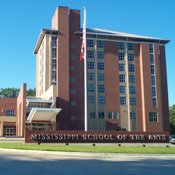With proposals for the merger of universities and public-school districts attracting substantial public outcry and debate, Gov. Haley Barbour's call for merging two statewide magnet high schools has drawn less vocal opposition at the state capitol. Educators, city leaders and legislators from Brookhaven, where the Mississippi School of the Arts is located, worry that higher-profile battles and a drastically smaller state budget may thwart their defense of the fledgling arts magnet school.
Barbour called for closing the School of the Arts and merging it with the Columbus-based Mississippi School for Math and Science, as part of a musical-chairs rotation of state facilities. The Mississippi School for the Blind and Deaf could then move to the Brookhaven campus, Barbour suggested, freeing up that school's Jackson campus for private development.
The governor suggested the moves in his Nov. 16 budget proposal. House Education Committee Chairman Cecil Brown, D-Jackson, sponsored the relocation bill this year, as he has in the two previous legislative sessions.
"It seems like we're fighting a battle almost every year," said Bill Sones, president of the Mississippi School of the Arts Foundation. "The Mississippi School of the Arts is one of the things that Mississippi is doing right. It seems ironic that it gets threatened almost every year without much real basis, usually by people who haven't even visited the campus and seen what's down here."
Opposition in the House defeated merger attempts last year, but Rep. Bobby Moak, D-Bogue Chitto, said that supporters of the school's current location would have a harder time this year.
"It probably stacks up a little bit different than it did last year," Moak said. "You've got a governor who's proposing moving the School of the Arts, and of course when the governor's in the mix, he's going to bring some Republican votes with him. Then you have some legislators who have followed in line with that who are not of the same party as the governor. Plus, we're in a year when funding is very short." " "The question is whether that's a way you actually will save money," Moak added. "And even if you save money, is it a good thing to do?
On Tuesday, the merger effort cleared its first hurdle, when the House Appropriations Committee approved Brown's bill. The measure, House Bill 599, now goes to the full House for approval.
Created by an act of the Legislature in 1999, the residential School of the Arts currently serves 170 11th and 12th grade students from across the state. Like MSMS, the School of the Arts has a majority-female student body. That could complicate a merger, MSA Executive Director Suzanne Hirsch said, as there might not be enough room in the vacant dormitories to house the two schools' female students.
Hirsch also said that upgrades to heating and air-conditioning at the vacant MUW dormitory could significantly raise the cost of a move. The logistical difficulties in moving the school over two months in the summer could further raise the cost of relocation. Moving student records out of the school's vault requires the presence of a certain number of staff observers to comply with state and federal law, for example.
"Our summer's filled already, so if you add any of that stuff in there, you're talking about a nightmare," Hirsch said. "You're not going to save money this year anyway. Even if they made us go July 1, the moving expenses alone are going to negate any savings."
In addition, the House bill does not touch on the most obvious source of savings: a merger of administrative operations at MSA and MSMS.
Beyond the immediate costs of relocation, a merger would also have a damaging effect on Brookhaven, Bill Sones warned. The city floated a $3 million bond issue to pay for improvements to MSA's campus when the school first opened, and it still has to pay back $2.1 million of that issue. The school provides roughly 135 jobs for local residents, and community members have adopted MSA students as their own, Sones said. An analysis from the state Institutions for Higher Learning estimated MSA's total economic impact for the state at around $6 million, including $35,000 in local sales tax revenue and $4.1 million in labor income.
"You can understand why it hits a nerve down here for anyone to be moving the Arts School before it has even had a chance to reach maturity," Sones said. "It's just a lot of money."
Also, thanks to a clause in the legislation that created MSA, the school's campus would revert back to the city in the event of a move, meaning that the state would effectively lose the $25 million it invested in buildings and infrastructure just a few years ago.
"Someone is going to look awfully foolish when that property reverts back with $25 million bucks' worth of infrastructure free and clear," Moak said.



Comments
Use the comment form below to begin a discussion about this content.
comments powered by Disqus